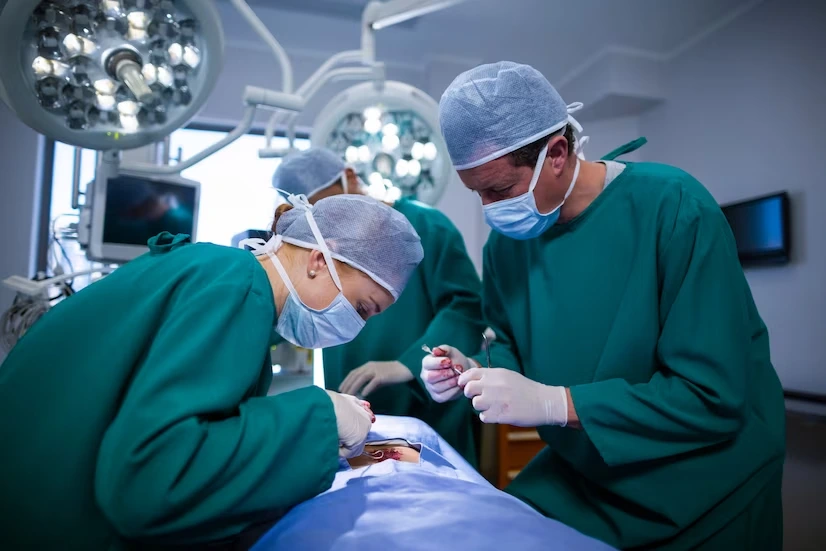Delaying hernia repair surgery is not advisable. Elective hernia surgery is often recommended and would be the wisest thing to do. The reason is hernias tend to get easily complicated and, in unfortunate cases, become life-threatening. So, it is better not to delay getting a hernia surgery.
This article will guide you on the risks associated with delaying hernia repair surgery and how long you can delay getting your hernia repaired.
Table of Contents
ToggleRisks of Hernia
The risks of hernia are manifold. If you experience any of the following symptoms, don’t wait for the hernia to heal itself and try to reduce hernia by own its wont help. Report them to a hernia specialist as soon as possible and receive the necessary treatment.
The risks associated with hernias are manifold. If you experience any of the following symptoms, don’t wait for the hernia to heal on its own or attempt self-reduction, as it won’t help. Instead, promptly report these symptoms to a hernia specialist to receive necessary treatment.
Delaying hernia treatment can escalate your hernia condition and result in the following scenarios:
- Incarceration
- Strangulation
- Bowel obstruction
- Pain and discomfort
1.Incarceration
When the hernia contents like the omentum, parts of the intestine, or other body parts get trapped inside the hernia sac, it is called an incarcerated hernia. An incarcerated hernia can develop into a strangulated hernia very quickly. So, it is better to take into consideration symptoms such as extreme pain, discomfort, and immovability of the hernia to its original place. These symptoms will help you identify an incarcerated hernia and take necessary treatments.
2.Strangulation
Strangulation is another serious complication of a worsening hernia. Strangulation can put your life at risk as it occurs when the blood supply to the contents of the hernia trapped in the sac gets cut off. When the blood supply gets cut off, the tissues begin to die and may end up in gangrene, a potentially life-threatening situation.
3.Bowel Obstruction
When the protruding intestines get obstructed and choked up, it can lead to major health ailments like bloating, serious abdominal pain, and constipation. This can make the pain due to a hernia unbearable. To prevent such painful ailments, you must have your hernia repaired as early as possible.
4.Pain and Discomfort
The major health disturbances caused by the hernia result in pain and high discomfort. This pain and discomfort can become unbearable and interfere with your regular routine. An increase in pain indicates that your hernia condition is turning serious. You can get your hernia repaired when it’s small and painless through minimally invasive techniques itself. So do not wait until your hernia turns unbearably painful
Risks of Delaying Hernia Treatment
As soon as you are diagnosed with a hernia, it is best to have it repaired. For elective surgery, minimally invasive surgical techniques are employed that have benefits such as smaller incisions, less blood loss, and faster recovery.
If you delay getting your hernia treated and it becomes complicated, the hernia can grow over time. As the size increases, surgery becomes more difficult. The larger hernia further weakens the affected muscles and tissues, causing severe pain and distress. You may have to undergo open surgery in case of an emergency.
Postponing your hernia repair may result in the following risks:
- Larger incision size
- Increased risk of complications during surgery
- Mortality
1.Larger Incision Size
When a hernia is operated under emergency situation, most often open surgeries are performed. Traditional open surgeries tend to leave larger incisions at the site of repair.
2.Increased Risk of Complications During Surgery
Complications such as excess blood loss, damage to the surrounding organs, mesh rejections, infections, and others may increase when the surgery is done under urgent circumstances.
3.Mortality
As the hernia repair gets delayed, the possibilities for incarceration, bowel obstruction, and strangulation increase, which may pose a bigger threat to the patient’s life.
How Long Can You Delay Hernia Surgery?
As long as the hernia is small and painless you can delay the hernia repair. When you get to encounter certain symptoms speed up your hernia repair decision.
Symptoms to look out for when diagnosed with hernia include:
- Extreme pain and discomfort
- Abdominal pain
- Bloating
- Constipation
- Vomiting
- Nausea, and others.
Conclusion
Hernia repair surgeries have been made easy and minimally painful with modern hernia repair techniques such as laparoscopy and robotic surgeries. They use minimal incisions, cause fewer complications, and less pain after surgery. Elective hernia repair surgeries often employ minimally invasive techniques over traditional open surgeries.
Therefore, upon diagnosis of hernia, go for elective hernia repair surgery. Do not delay the surgery, as this can complicate the hernia condition.
Visit an expert hernia surgeon today, evaluate your hernia condition, and book your surgery date as soon as possible.
Wishing you a safe and successful hernia repair!
Dr. K. Amilthan MBBS., MS., FMAS., FALS.
Heal Your Hernia Now:
- 15+ Years of Experience
- 3,000+ Surgeries
Your Journey to Wellness Begins with us.
FAQ's
No, a hernia will not heal on its own, even after a significant period of time. This is because hernias are anatomical defects that cannot be repaired using medications. For the ultimate cure, hernias require surgical intervention.
by massaging the hernia region, following a hernia-friendly diet, and reducing your BMI (Body Mass Index) if needed through moderate exercises approved by your healthcare provider. You can also take painkillers to alleviate pain, but only with a proper prescription.
The duration of delaying your hernia repair surgery depends upon factors such as its seriousness, size, other ailments, and so on. Hernias are normally advised to be repaired before they get complicated, which can happen at any time, especially in the case of larger hernias.

Dr. Amilthan
Dr. Amilthan is a renowned laparoscopic hernia surgeon based in Chennai, with over 15+ years of experience in general surgery. He completed his MBBS and MS in General Surgery at Kilpauk Medical College and Government Royapettah Hospital in Chennai.
- All Posts
- Hernia Blog

Which Doctor should you consult for Hernia? You can Consult a general surgeon or a hernia specialist for evaluation and...

A hernia occurs when an organ or any other part of your body pushes through the muscle and surrounding tissue...

An inguinal hernia occurs when the organs push through and bulge against the weak muscles of the abdomen. An effective...

